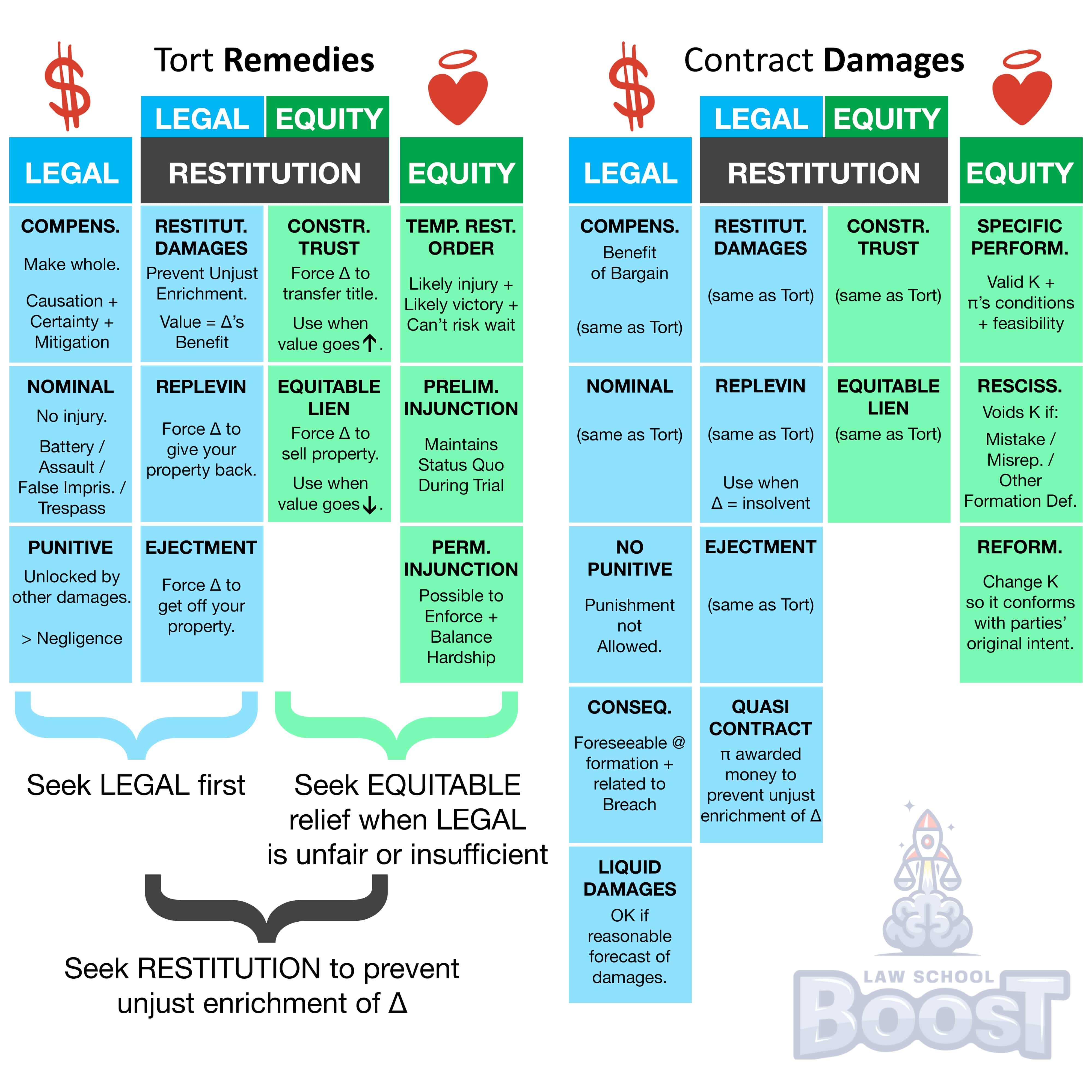🏥
Remedies • Tort - Legal Restitutionary Remedies
REM#016
Legal Definition
Ejectment allows the plaintiff to recover possession of specific real property, and is available where (1) the plaintiff has a right to possession*, and *(2)* there has been a wrongful withholding by the defendant.
Ejectment is available only against a defendant who has possession of property, such as an adverse possessor or holdover tenant. Where ejectment is available, the sheriff ejects the defendant from the property, as the plaintiff cannot resort to self-help.
Ejectment is available only against a defendant who has possession of property, such as an adverse possessor or holdover tenant. Where ejectment is available, the sheriff ejects the defendant from the property, as the plaintiff cannot resort to self-help.
Plain English Explanation
In a previous card, you learned about replevin, which is used to legally force someone to give personal property (or chattel) back to its rightful owner. The equivalent of replevin for real property is ejectment. Ejectment ejects someone from a property who is currently in possession of the property but shouldn't be. For example, ejectment can be used against someone who is adversely possessing property (sometimes called a "squatter"), or it can be used to kick out a tenant who has stayed beyond the period of their lease (called a "holdover tenant").
The idea behind ejectment is that the court doesn't want people to resort to "self-help." In other words, if a person is wrongfully possessing your land or home, the court doesn't want you to break into the house and physically assault the person, even though it may feel like the right thing to do since they are being a jerk. Instead, you're supposed to talk to the court, who will send a sheriff to do the dirty work (and make sure that things are kept as peaceful as possible in an otherwise tense situation).
The idea behind ejectment is that the court doesn't want people to resort to "self-help." In other words, if a person is wrongfully possessing your land or home, the court doesn't want you to break into the house and physically assault the person, even though it may feel like the right thing to do since they are being a jerk. Instead, you're supposed to talk to the court, who will send a sheriff to do the dirty work (and make sure that things are kept as peaceful as possible in an otherwise tense situation).
Hypothetical
Hypo 1: Sam owns a house he rents out. Bob falls behind on rent and eventually, after the lease expires, refuses to leave. After giving notice, Sam files an ejectment action. The court rules Bob is unlawfully possessing the property and orders the sheriff to remove Bob. Result: Ejectment properly applied since Sam had the superior right to possession as the owner, and Bob was unlawfully possessing the property by not paying rent.
Hypo 2: Sam owns a house. Bob moves in with permission from Sam to be his roommate. After a fight, Sam changes the locks when Bob is gone and puts his stuff on the curb. Result: Here Sam used unlawful self-help tactics instead of judicial process to try removing Bob. This likely constitutes an illegal eviction since tenants must be formally evicted through court proceedings. Ejectment would not apply since Bob had a legal right to possess the property.
Hypo 3: Sam owns a house he advertises for rent. Bob signs a lease agreement and moves in. The next year, Bob stays past the lease expiration. Sam files an ejectment action to remove Bob as a holdover tenant. The court agrees Bob is unlawfully possessing the property and orders his removal. Result: Another proper use of ejectment. Once Bob's lease expired he became a holdover tenant lacking permission to keep possessing, so Sam had superior claim to the house.
Hypo 2: Sam owns a house. Bob moves in with permission from Sam to be his roommate. After a fight, Sam changes the locks when Bob is gone and puts his stuff on the curb. Result: Here Sam used unlawful self-help tactics instead of judicial process to try removing Bob. This likely constitutes an illegal eviction since tenants must be formally evicted through court proceedings. Ejectment would not apply since Bob had a legal right to possess the property.
Hypo 3: Sam owns a house he advertises for rent. Bob signs a lease agreement and moves in. The next year, Bob stays past the lease expiration. Sam files an ejectment action to remove Bob as a holdover tenant. The court agrees Bob is unlawfully possessing the property and orders his removal. Result: Another proper use of ejectment. Once Bob's lease expired he became a holdover tenant lacking permission to keep possessing, so Sam had superior claim to the house.
Visual Aids



